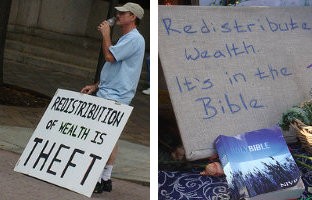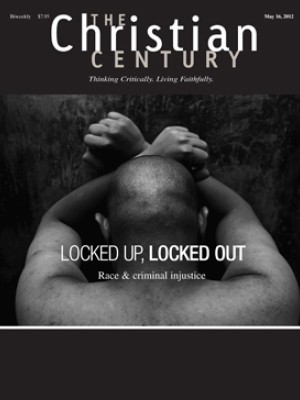Money movers: What governments do

“Redistribute My Work Ethic,” a bumper sticker recently exhorted those of us driving north on Chicago’s Tri-State Tollway. The slogan probably owes its existence to Barack Obama’s 2008 campaign run-in with “Joe the Plumber” Wurzelbacher (now Joe the congressional candidate), to whom Obama explained that all Americans benefit when we “spread the wealth around.” Obama’s off-the-cuff phrase—never to my knowledge repeated in an official campaign or administration statement—has spawned a whole rhetorical frame within which to attack the president’s policies. “Redistribute My Work Ethic” captures this conviction: government programs redistribute wealth from the hard-working rich to the lazy poor.
According to a Gallup poll, Americans are closely divided on whether government should redistribute wealth by way of “heavy taxes on the rich,” with Democrats much more favorable toward the proposition than Republicans and independents. This difference comes into play whenever Democratic politicians propose rolling back the upper-bracket tax cuts initiated by George W. Bush in order to pay for something, such as the payroll tax holiday, health insurance subsidies for the poor and middle class or food stamps. This division in popular opinion may be why the president rejects the “redistribution” label when promoting his policies.
Read our latest issue or browse back issues.
But what poll respondents and disgruntled motorists don’t seem to appreciate is that redistributing wealth is what all public budgets do. And the biggest redistribution that the federal budget effects is not from the rich to the poor; it’s from the young and middle-aged to the old. Social Security and Medicare cost $1.1 trillion in 2010, a third of the federal budget. These programs are dear to liberals, and their overall effect is mildly progressive. But their first function is to spread wealth from working-age people (regardless of their incomes) to retirement-age people (regardless of their incomes) and to their doctors.
The federal budget also redistributes wealth from people who work outside the defense industry to people who work inside it. (Defense and security spending accounted for $705 billion of the budget in 2010, about one-fifth of the total.) It redistributes wealth from nonfarmers to farmers ($3.5 billion for 887 corn growers alone in 2010) and, ultimately, from the people at large to those who are engaged in any kind of public role: FBI agents, park rangers, food inspectors and so on.
When we consider the tax code, there’s still more money being spread around. One very popular tax deduction spreads wealth from people who don’t have mortgages to people who do—$104 billion of it last year, a very bad year for housing. Pension contributions aren’t taxed; neither is employer-provided health insurance, a policy that redistributed $177 billion last year. These “tax expenditures” spend a larger share of our national income than Social Security does, and by their nature they flow mostly to those who earn enough to pay taxes in higher brackets and to itemize their deductions. (And yes, the charitable giving deduction that helps sustain the professions of many of this magazine’s readers and contributors is very much another instance.)
In light of all this, the particular kind of redistribution that captivates American politics is a rather minor matter. Yes, some programs do effectively transfer wealth on a family-income basis. Medicaid is by far the largest, but the relative stinginess of programs such as food stamps and school lunches hasn’t given them a pass in the public debate. Temporary Aid to Needy Families, which replaced the welfare program of the 1990s, is the largest poverty-based income support program. It cost $17 billion in 2010, or about two months of the mortgage interest tax deduction.
The very idea of a government assumes that there are public purposes that justify taking some share of private goods. Our current federal budget represents—for good or ill, and with all the distortions created by lobbying, influence and bad policy—our democratic deliberation on what exactly is worth taxing people for. And whatever their shortcomings, these redistributive policies directly or indirectly benefit virtually everyone in America.
So it is tempting for progressives to dismiss complaints about redistribution of wealth as ignorant or hypocritical, as in many cases they probably are. Yet all naïveté about public budgets aside, a strong presumption in favor of being able to keep the money you earn is a valuable and powerful thing. Progressives who embrace the concept of wealth redistribution on egalitarian grounds, or who join the refrain of “tax the rich” as the main solution to our fiscal and economic problems, tend to miss the many ways in which economic unfairness can remain untouched or even affirmed by redistributive policies.
As Slate columnist Matthew Yglesias puts it, “There’s something deeply unimaginative, cramped, narrow, and fundamentally incorrect about this vision of America where everything is on the level, but people need to pay a top marginal income tax rate of 39.5 percent rather than 35 percent.” It’s an inadequate vision because not all wealth is equal, from a moral point of view: “Making a living as a patent troll,” Yglesias continues, “is totally different from making a living as a genuine innovator.”
It’s important to focus rhetoric and activism on making the rich “pay their fair share”—especially during this austerity season, in which the practical alternative is watching services for the poor dramatically cut. The Torah, for example, is quite specific about the need to redistribute wealth from the owners of cropland to the dependent population that gleaned its margins. It is also a source for the principles of labor law: the Sabbath day worked to level the playing field somewhat between rich and poor, as did the law against keeping a laborer’s wages overnight.
This can’t, however, be the final analysis of redistributive policies. Throughout the Old Testament, inequality itself is hardly the only issue. There is also the question of fair access to the means of making a living—which, in the Old Testament world, means fair access to land ownership.
The prophets hearken back to this as an ideal. “Ah, you who join house to house, who add field to field, until there is room for no one but you,” exclaims Isaiah (5:8), lamenting the exclusion of the people from the land in which God planted them. Micah likewise complains of the perfidy of the ruling classes who “covet fields and seize them”; they “oppress householder and house, people and their inheritance” (2:2). Ezekiel condemns the sheep of Israel for not only feeding on the good pasture but “tread[ing] down with your feet the rest of your pasture”—the land worked by the marginal people (34:18).
In Who Were the Early Israelites and Where Did They Come From? William Dever summarizes the “vision of Israel’s restoration as the true kingdom of God” with Micah’s image of “every man sitting under his vine and under his fig tree; and none shall make him afraid” (4:9). The emphasis, Dever argues, is on land, private ownership, freedom from oppression and God’s sovereignty. A substantial scholarly tradition goes so far as to root the origin of Israelite identity in a land reform movement, an agrarian social revolution in Canaan.
Analogies to our own time are not as distant as we might expect. Home foreclosures have been happening on what you might fairly call a biblical scale, in a pattern of legally authorized pauperization that the prophets would clearly recognize. In less obvious ways, government policies can limit the ability of people to sell their labor—the equivalent, for most of us, of access to the land in an ancient agrarian society.
At the local level, access to the means to make a living can be frustrated by a host of regulations. Land-use regulations, occupational licensing and zoning laws can have a legitimate public purpose. But they can easily reach beyond this toward simply protecting existing business from new competition or making it harder than necessary for the poor to find work or to afford basic services. Even the use of one’s own property can be closely limited. It can be shockingly difficult to rent out a spare room or grow vegetables in your front yard to make ends meet during difficult times.
In a whole variety of ways, redistribution of wealth is much of what government is up to. We are well acquainted with the ways in which this can be an instrument of justice and decency. But often enough—both historically and in our time—it can be used against the poor and those who live by their labor. The result is to leave the work ethic of the poor untested by the opportunity to earn a legitimate living.






